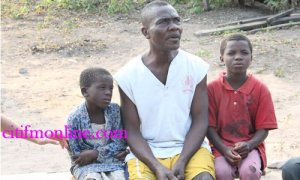The City of Accra is considered to be a relatively buoyant place to live in Ghana. The influx of Ghanaians from other parts of the country to the City just to work is proof of that.
Accra, arguable has virtually everything one needs for a comfortable life. Its lushness has constantly lured many youth from deprived areas. But the affluence of Accra does not properly portray its entirety. It has a dark side which many people would simply wish away.
Some of its peripheral communities are as deprived and isolated as the very remote hinterlands. One of such peripheral communities is Tomefa, a marooned Island with about 1500 people. Their deprivation paints a totally different portrait of Accra. “Tomefa” means “peace of mind” in the Ewe language.
But peace of mind is one thing the dwellers have never known. It is a luxury to them because they lack the most fundamentals of life. They have no treated water, no health facilities, no schools and virtually nothing.
Located at the outskirts of Weija, the Island is surrounded by the Densu River which flows into the artificial dam that is treated by the Weija water treatment plant to serve the greater part of the City of Accra.
It has been a safe haven for the residents for over four decades now but their lives keep deteriorating. Some of them have died of diseases caused by contaminated water and shear ignorance due to the lack of a school there.
Some children on the Island have drowned in the past in their efforts to ferry over to other neighbouring communities to attend school.
The Island dwellers told The Globe team that visited recently that previous and current governments have neglected the Island despite several appeals. The Linguist to the Chief of the Island said “they all come here during election year and ask for votes, after that you will not see them again until another election year” adding “we don’t have water to drink and sometimes when the doctors visit the Island, they say our children are suffering from Bilharzia”.
One person who is suffering the brunt of the neglect of the Island is 51-year old farmer whose entire family has gone totally blind. His 39-year-old wife Oleki Odorko-Tei and three of their five children are all blind.
They have lost their sight since infancy. Gladys, 16; Victoria, 9; and Stella, 5 are the unfortunate sufferers of the effects of lack of treated water on the Island. They are unable to attend school because of their situation and hardly mingle with other children on the main Island.
The mystery behind the calamity has been a bother to Mr. Odorko-Tei and other Island dwellers. Some of them attribute the situation to a curse but the father of five believes it is the effect of the contaminated water around the Island from which they all drink.
The water body is polluted by the chemicals that officials of the Weija treatment plant use in sanitizing the water for customers of the Ghana water company. Ironically, though the Island is very close to the water treatment plant, none of the treated water is supplied to the Island.
Mr. Odorko-Tei isolated his family from the main Island to the outskirts of the main Island to avoid mockery from other members of the village due to the predicament of his family.
He told The Globe in an interview that “I don’t care what people say, all I care about is my family and I feel happy that I can provide for them”. All he wants is to see his blind children and wife regain their sight.
He said “…I will be the happiest man on earth, if I get the eyes of my children operated on, to enable them see. That is all I need. Look, I am old now and if I die and leave them, who will take care of them? That is my problem and I hope help comes one day”.
Mr. Odorko-Tei owns a farmland and works on it with his second wife who is also blind. Their other four children usually stay around to help.
When asked whether or not he has been to the hospital with his blind children and wife, Mr. Odorko-Tei said “yes I have been there four months ago, I went to Korle-Bu and the doctors said they can operate on them since the eyes are not completely destroyed. But they asked that I come with money. I am still searching”.
He did not sound positive about raising enough money to save the sight of his children and wife, although he could not disclose the exact amount the doctors asked for.
“Please help me raise the money so I can help my children, I will be very happy if I get them to see before I die” Mr. Odorko-Tei pleaded to The Globe. He and other residents of the Tomefa Island are hoping for a change in their current situation and appealed to government and other philanthropists to support the development of the Island to an appreciable level.
General News of Tuesday, 30 August 2011
Source: The Globe

















